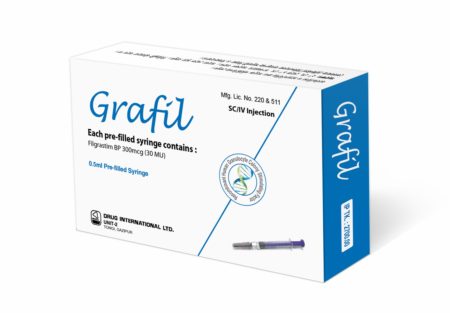
Type:Injection
Generic Name:Filgrastim
Manufacturer:Drug International Ltd.
Price:৳1200.00
Myelosuppressive chemotherapy, Acute Myeloid Leukemia, receiving induction or consolidation chemotherapy, Peripheral blood progenitor cell collection and therapy, Severe Neutropenia, Bone marrow transplantation, HIV infection.
IV Preparation Vials may be diluted in D5W to >15 mcg/mL for infusion 5-15 mcg/mL dilution: Protect from adsorption to plastic materials by the addition of human albumin to a final concentration of 2 mg/mL Do not dilute with saline at any time, because the product may precipitate IV Administration Short IV infusion over 15-30 min, OR Continuous IV infusion SC Administration Administer undiluted by SC in the outer area of upper arms, abdomen, thighs, or upper outer areas of the buttock
Parenteral Chemotherapy-induced neutropenia Adult: 5 mcg/kg daily as a single daily SC inj, as a continuous IV or SC infusion, or as a daily IV infusion over 15-30 minutes, starting not <24 hr after the last dose of antineoplastic. Continue treatment until neutrophil count has stabilised within the normal range which may take up to 14 days or more. Bone marrow transplantation Adult: 10 mcg/kg daily by IV infusion over 30 min or 4 hr or continuous IV or SC infusion over 24 hr. Adjust according to response. Subcutaneous Mobilisation of peripheral blood progenitor cells for autologous peripheral blood stem cell transplantation Adult: 10 mcg/kg daily, as a single inj or by continuous infusion, for 4-7 days until the last leucapheresis procedure. If it is given after myelosuppressive chemotherapy: 5 mcg/kg daily by inj; given from the 1st day after chemotherapy completion until expected neutrophil nadir is passed and neutrophil count has returned to normal range, so that leucapheresis can be performed. Congenital neutropenia Adult: 12 mcg/kg daily in single or divided doses. Adjust according to response. In patients with cyclic or idiopathic neutropenia: 5 mcg/kg daily in single or divided doses. Adjust according to response. HIV infection and persistent neutropenia Adult: Initially, 1 mcg/kg daily. Dose may be increased to 4 mcg/kg daily until normal neutrophil count is achieved. Maintenance: 300 mcg daily. Max: 4 mcg/kg daily.
Hypersensitivity to E. coli derived proteins, Filgrastim or any component of the product. Myeloid malignancies. Not to be used within 24 hr of cytotoxic chemotherapy admin due to the sensitivity of rapidly dividing myeloid cells. Severe congenital neutropaenia (Kostman's syndrome) with abnormal cytogenetics.
Filgrastim is a granulocyte-colony stimulating factor which binds to cell surface receptors on haemetopoietic cells thus stimulating the development of granulocytes to increase their migration and cytotoxicity.
Filgrastim should not be administered within 24 hours before and after chemotherapy. Premalignant or malignant myeloid condition; sickle-cell disease; osteoporotic bone disease; withdraw treatment if there are signs of pulmonary infiltrates. Fluid retention or heart failure. Monitor CBC and platelet count during therapy. Monitor bone density in patients with osteoporosis (long-term treatment). Regular morphological and cytogenic bone-marrow examinations in severe congenital neutropenia. Pregnancy and lactation. Lactation: excretion in milk unknown; use with caution
>10% Nausea (57%),Vomiting (57%),Bone pain (22%-33%),Alopecia (18%),Diarrhea (14%),Fever (12%),Fatigue (11%) 1-10% Headache,Anorexia,Chest pain,Cough,Dyspnea,Constipation,Stomatitis,Sore throat,Rash Frequency Not Defined Elevated uric acid,Elevated lactate dehydrogenase,Elevated alkaline phosphatase Potentially Fatal: Pulmonary infiltrates leading to resp failure or acute resp distress syndrome.
Pregnancy Available data from published studies, including several observational studies of pregnancy outcomes in women exposed to filgrastim products and those who were unexposed, have not established an association with use during pregnancy and major birth defects, miscarriage, or adverse maternal or fetal outcomes Reports in scientific literature have described transplacental passage of drug in pregnant women when administered less than or equal to 30 hours prior to preterm delivery (less than or equal to 30 weeks' gestation) In animal reproduction studies, effects of filgrastim on prenatal development have been studied in rats and rabbits; no malformations were observed in either species; no maternal or fetal effects were observed in pregnant rats at doses up to 58 times the human doses; drug has been shown to have adverse effects in pregnant rabbits at doses 2 -10 times higher than the human doses Lactation There is published literature documenting transfer of filgrastim into human milk; there are a few case reports describing use of filgrastim in breastfeeding mothers with no adverse effects noted in the infants; there are no data on effects of filgrastim on milk production; other filgrastim products are secreted poorly into breast milk, and filgrastim products are not absorbed orally by neonates; developmental and health benefits of breastfeeding should be considered along with mother’s clinical need for therapy and any potential adverse effects on the breastfed child from the drug or from underlying maternal condition
Myelosuppressive antineoplastic agents. Drugs which may potentiate the release of neutrophils e.g. lithium.